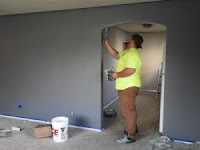What are Your Options if you Are Renovating your Basement and Need Radon Remediation Options?
Basement renovations are a very popular type of home improvement here in Pennsylvania. After all, with just a fair investment, homeowners can sometimes double the size of their home by simply transforming the space underneath their floor into another livable floor. Yet doing so comes with its own risks for those who get started without a long-term plan in mind. Part of that plan should be radon testing and if needed, radon remediation options .
Testing for radon is beneficial at any point in the basement renovation. However, we recommend performing the testing before the major tasks are complete, because once the basement’s concrete floor has been covered, sealing with a radon remediation product may be financially impracticable. You can either test for radon with a DIY home kit purchased at your local home improvement store or have a radon remediation expert come in and use state-of-the-art testing equipment for a more thorough analysis and immediate feedback on how high the radon levels are in your basement.
It is republished with permission of the author.
Test for Radon Before, During, or After Renovations
One of the most important things to research when renovating a basement is radon testing and radon remediation services. Radon is an odorless, radioactive gas that naturally rises from the ground and commonly permeates through foundation materials to spread into a basement or other rooms of a home. Exposure to high levels of radon is akin to exposing the body to the equivalent of 200 chest x-rays annually and puts a person at high risk of lung cancer.Testing for radon is beneficial at any point in the basement renovation. However, we recommend performing the testing before the major tasks are complete, because once the basement’s concrete floor has been covered, sealing with a radon remediation product may be financially impracticable. You can either test for radon with a DIY home kit purchased at your local home improvement store or have a radon remediation expert come in and use state-of-the-art testing equipment for a more thorough analysis and immediate feedback on how high the radon levels are in your basement.
Radon Remediation Options to Remove Radon Gas
There are several options for homeowners who discover high levels of radon in their basement. A few primary types of radon remediation systems include:Sub-Slab Depressurization
Sometimes called sub-slab suction, this radon remediation option removes air from under the foundation. A fan and vents the radon gas outside the home through an installed fan and a pipe. The air and radon are vented out from the foundation to the outside of the house.Sub-Membrane Ventilation
Also known as depressurization, this radon remediation technique is most effective in buildings with crawlspaces or basements. Similar to sub-slab depressurization, the method involves placing a plastic barrier over the soil as a collection cover.Block Wall Suction
This depressurization technique prevents radon from reentering the home. A fan and ductwork are utilized to draw suction on the hollow interiors of a concrete block wall. The method works by keeping the air pressure within the wall lower than the air pressure in the basement. The radon gas is then removed before entering the basement.Call Radon-Rid for Skilled Radon Testing and Radon Remediation Options in PA
Radon-Rid’s skilled specialists are committed to making the homes of Pennsylvania residents safe. We have years of experience identifying the presence of radon gas and then supplying the most effective radon remediation options for radon mitigation. For information about our services or to schedule a consultation, contact us today.
Radon Remediation and Mitigation published this post originally at: https://www.radonrid.com/what-are-your-options-if-you-are-renovating-your-basement-and-need-radon-remediation-options/



Mga Komento
Mag-post ng isang Komento